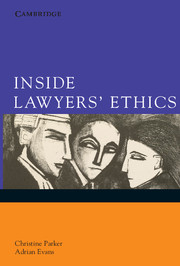Book contents
- Frontmatter
- Contents
- Preface
- Acknowledgments
- List of tables
- List of figures
- List of illustrations
- List of case studies
- Table of statutes
- Table of cases
- 1 Introduction: Values in Practice
- 2 Alternatives to Adversarial Advocacy
- 3 The Responsibility Climate: Regulation of Lawyers' Ethics
- 4 Civil Litigation and Excessive Adversarialism
- 5 Ethics in Criminal Justice: Proof and Truth
- 6 Ethics in Negotiation and Alternative Dispute Resolution
- 7 Conflicting Loyalties
- 8 Lawyers' Fees and Costs: Billing and Over-Charging
- 9 Corporate Lawyers and Corporate Misconduct
- 10 Conclusion – Personal Professionalism: Personal Values and Legal Professionalism
- Index
- References
3 - The Responsibility Climate: Regulation of Lawyers' Ethics
- Frontmatter
- Contents
- Preface
- Acknowledgments
- List of tables
- List of figures
- List of illustrations
- List of case studies
- Table of statutes
- Table of cases
- 1 Introduction: Values in Practice
- 2 Alternatives to Adversarial Advocacy
- 3 The Responsibility Climate: Regulation of Lawyers' Ethics
- 4 Civil Litigation and Excessive Adversarialism
- 5 Ethics in Criminal Justice: Proof and Truth
- 6 Ethics in Negotiation and Alternative Dispute Resolution
- 7 Conflicting Loyalties
- 8 Lawyers' Fees and Costs: Billing and Over-Charging
- 9 Corporate Lawyers and Corporate Misconduct
- 10 Conclusion – Personal Professionalism: Personal Values and Legal Professionalism
- Index
- References
Summary
Introduction
This chapter considers how the structure and processes of the regulatory systems that govern the legal profession are relevant to lawyers' ethics and behaviour – that is, the significance of ‘institutions’ for lawyers' ethics. Traditionally, as we shall see, the legal profession self-regulated on the basis of blind confidence that any misbehaviour by lawyers was an individual anomaly, while the culture and practices of the profession as a whole were ethical. Most lawyers probably spend more time thinking about their personal ethics than the way the legal profession as a whole is structured and regulated. But the ethical character of lawyers' practices does not depend on personal factors alone. In practice, personal ethical decisions will either be supported or undermined by the surrounding ‘institutional’ ethical culture and processes in which they are embedded. Personal ethics will be influenced by institutional constraints such as who sets and enforces the rules that govern the legal profession, what ethical and conduct issues the rules address, what values are represented in what the rules say, and whose interests are promoted and whose interests are ignored in those rules – those of lawyers, clients, the community or the profession?
In this chapter we consider two principal ways in which the ethics demonstrated by the legal profession as a whole are likely to impact on lawyers' individual and personal ethics: First, we consider the ethical dimensions of different models of regulation of the legal profession – self-regulation, co-regulation and independent regulation.
- Type
- Chapter
- Information
- Inside Lawyers' Ethics , pp. 41 - 65Publisher: Cambridge University PressPrint publication year: 2007



